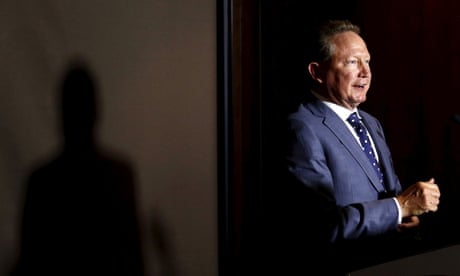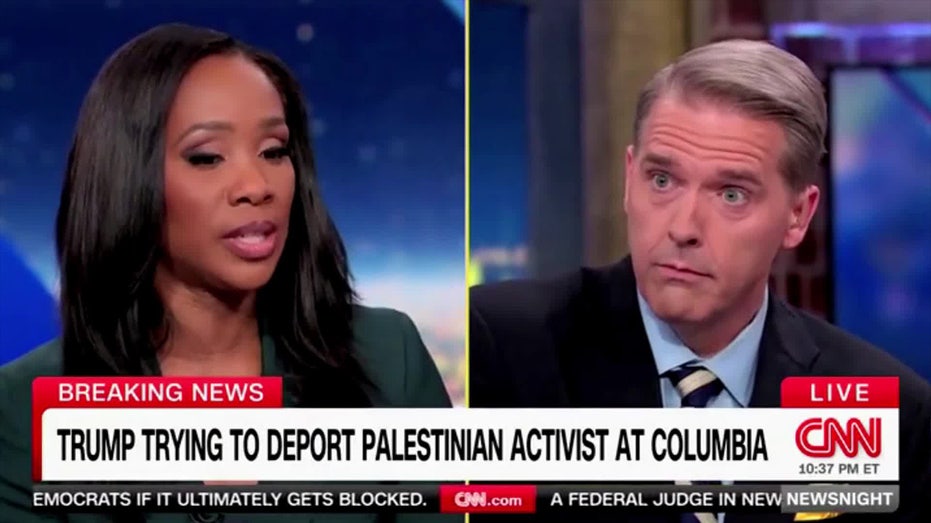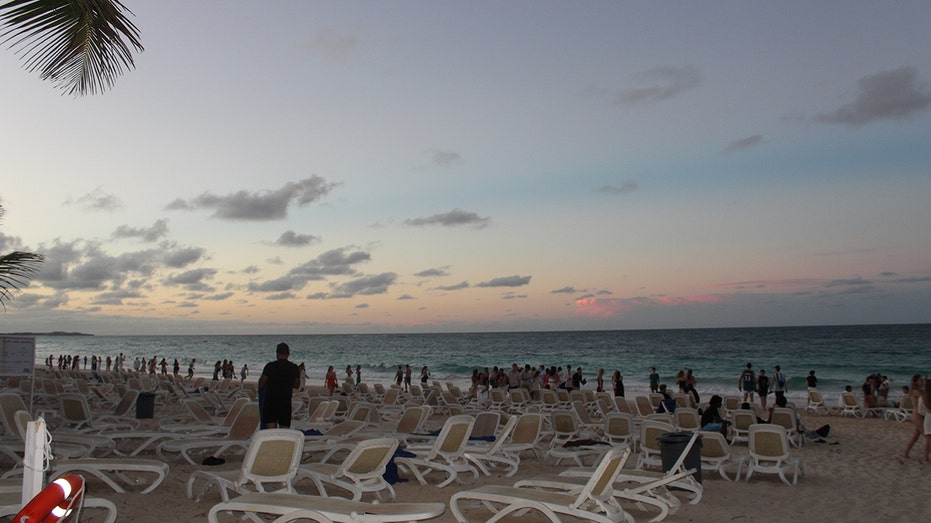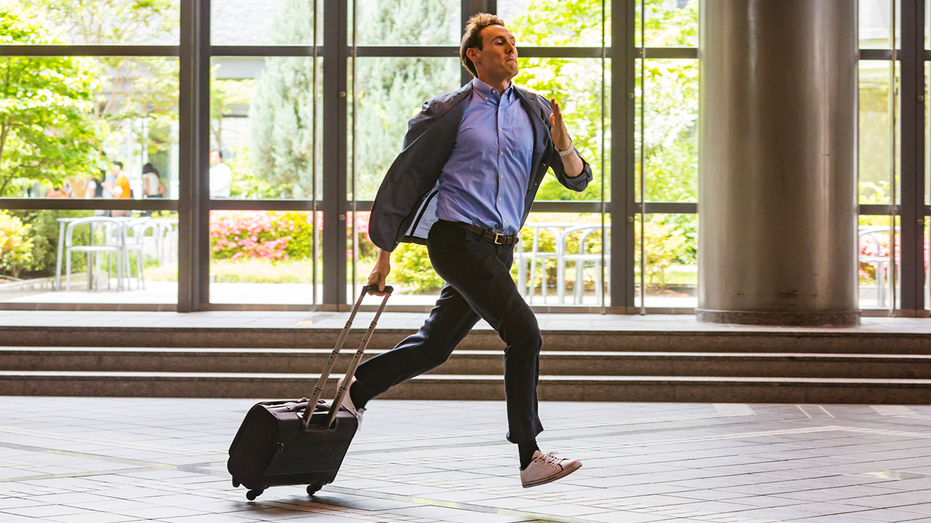- by foxnews
- 12 Mar 2025
‘Judge me on my actions’: can Andrew Forrest become Australia’s clean, green hero?
‘Judge me on my actions’: can Andrew Forrest become Australia’s clean, green hero?
- by theguardian
- 27 Mar 2022
- in news

Andrew Forrest says he isn't after power. He didn't aim to become wealthy. The 27.2 billion dollar man just "wants to leave the world a better place".
The American novelist John Barth wrote that "everyone is necessarily the hero of his own life story". Forrest is certainly that. But his story - including, but not limited to, the staggering success of his iron ore business and the even more staggering ambition of his clean energy plans - is writ large enough for others to read. And they don't all see him as a white knight.
Forrest is a very busy and very complicated man. People describe him as paradoxical but passionate, driven and difficult, ambitious and controlling.
Those who have met him talk about his unswerving confidence, his charm. Some mention his generosity, such as the Giving Pledge he signed with his wife, Nicola. One person close to him says he's emulating thefounder of Microsoft, Bill Gates, with the scale of his philanthropy.
The most critical decline to speak publicly.
Forrest is the founder and now non-executive chair of Fortescue Metals Group, the WA mining ore business that made a profit of almost $14bn last financial year; the founder and chair of its subsidiary Fortescue Future Industries, which plans to deliver 15m tonnes of green hydrogen to the world by 2030; and chair of the Minderoo Foundation, his charitable arm. The fourth pillar of his business world is the family holding company, Tattarang, a private investment group with a multibillion-dollar portfolio of assets earning money for Minderoo.
He's one of Australia's richest men and, especially during the pandemic, one of the busiest people on the planet.
He was buying Covid tests and PPE, dodging deadly terrorist attacks in Afghanistan, making deals in PNG. His presence loomed large at Cop26. He scooted around in his private plane, invested in medicinal cannabis and snapped up Lizard Island for $42m.
He's developing electric trains and green ammonia-powered ships (it's impossible to keep up with all the environmental projects he's involved in). He has invested in aquaculture and cheese. And he has continued to tackle Facebook for for its alleged failure to stop cryptocurrency-related scam ads featuring his image.
Asked if he has ever felt that he has bitten off more than he can chew, he tells Guardian Australia what he used to tell his staff at Anaconda Nickel, his first big venture: "You bite off more than you can chew, then you chew like buggery."
While Australia faced rolling Covid lockdowns and border closures, Forrest and his team took a private jet to visit more than 40 countries on a mission to convince the world of the need for green hydrogen.
His plan so far has elicited both hope and scepticism.
It may seem "ironic", he says, that he's on this clean, green mission, when FMG is "a huge player in carbon pollution". In an ad for FFI, Forrest thanks the fossil fuel industry for its "great service".
Flanked by a vaguely Downton Abbey-style breakfast spread that features a toast rack, a teapot and bowls of berries, he holds a fake newspaper with the headline: "Fossil fuel industry in terminal decline".
"Climate chaos" will render humanity extinct if the use of fossil fuels continues unchecked, he warns.
"[The] party's over," he says, as ominous music plays. "I know it, you know it."
Forrest has pushed the federal government to adopt a net zero emissions target by 2050, even as he continues to mine iron ore, which he said recently had "a fabulous future".
In a more nuanced take at his National Press Club speech last year, he said: "So, let's keep fossil fuel going but only as long as we need to, and let's do everything we need to switch to a green future."
The party may be over, it seems, but Forrest has not yet grabbed his coat.
Asked if FFI will morally offset what FMG has done, he says the question is "moronic".
"If you take a second in time only," he says, "then nothing excuses anyone for doing anything wrong.
It's a hugely ambitious plan, but Forrest points to FMG's success saying people doubted it would ever mine 40m tonnes of iron ore. "We're clicking a little under 200m tonnes," he says, "and the iron ore price is strong.
"If I said something which I'm going to put my heart and soul to - judge me on my actions, judge me on whether I die trying, but don't say 'he makes grandiose statements' because you've got to judge people on what they do, not on what other people say or what they say."
Considering his enormous power, influence, wealth and promises, it's worth taking a look at what he has done, and said.
Forrest grew up at Minderoo station running cattle in the Pilbara, out in Western Australia. His great-grandfather David Forrest founded the station with his brothers, including John, who would go on to become WA's first premier. His father was forced to sell the property, but he bought it back for a reported $12m in 2009.
Forrest went to high school and then university in Perth, before beginning Anaconda Nickel in the early 1990s.
In 2001 investors tried to oust him as chief executive after the share price dipped. Forrest agreed to step down, calling it "a nasty precedent in Australia's corporate history".
In 2002 the ABC's Four Corners detailed the messy break-up, saying Forrest "mixed business with philanthropy", donating shares from Anaconda to one of his charities, Leaping Joey. That led to accusations he was minimising his income tax - an accusation he described as "really, really hurtful".
Forrest says those comments were "a long time ago".
"I'm doing everything in my power to leave this world a better place if I possibly can," he says. "Yet the Guardian does tend to draw out every possible negative story they can find, even going back to my old friend Warwick.
"Sometimes people are really pissed off with you," he says, although the pair have now reconciled.
Grigor agrees. "Time cures everything," he says.
"We had our disagreements. He's gone on and done wonderful things, and things that I don't know any other Australian is capable of doing. His life is very different to mine and I'm grateful for that. I don't bear him any animosity."
Forrest's next major move was establishing FMG, now one of the world's largest iron ore companies - he stepped down as chief operating officer and became its chair in 2011. It has been lauded for awarding more than $3bn in contracts to Aboriginal companies, but also condemned for allegedly breaching heritage protection laws at a sacred site in the Pilbara in February 2021. In that case FMG's chief executive, Elizabeth Gaines, expressed regret and issued "a sincere apology on behalf of Fortescue" for what it called an administrative error.
In 2020, the high court dismissed an appeal by FMG against a decision to give the Yindjibarndi people native title over land in the Pilbara after a long battle over access and royalties.
Then came the battle against the mining tax, which Forrest and FMG took all the way to the high court. The court ultimately rejected the move to overturn the Minerals Resource Rent Tax, which forced coal and iron ore companies to pay 22.5% on profits above $75m.
It wasn't the last time Forrest would be attacked for trying to influence government policy.
As prime minister, Tony Abbott commissioned Forrest to write a report on employment and training.
The report Forrest produced in 2014, Creating Parity, ventured much further afield by introducing the idea of a "healthy welfare card" - a precursor to the cashless debit card. This card, Forrest said, would assist people to make "proper decisions" by stopping them using welfare to buy alcohol or cigarettes.
The card has drawn fierce criticism from Indigenous organisations and their supporters.
The National Aboriginal Community Controlled Health Organisation, the peak body, has been a consistent critic. In a submission to a Senate inquiry it said when the card was compulsory it was a "violation of Aboriginal and Torres Strait Islander people's right to self-determination" and had "adverse effects on the social and emotional wellbeing and general health of participants".
There had been inadequate consultation, Naccho said, and inadequate evidence that the card worked to prevent gambling and drinking.
The WA Labor senator Sue Lines called the card "racist" in parliament. "It takes away people's basic human rights," she said.
Lines questioned why Forrest was asked to do the work in the first place. "Was it a well-researched idea backed up with academic evidence? No. It came from a billionaire based in WA. It was an idea of Twiggy Forrest's," she said.
The Ngaatyanjarra shire president, Damian McLean, says Forrest is "a guy with prodigious financial interests who should have been excluded from everything to do with Indigenous affairs".
Forrest calls accusations of racism "bullshit". He says he was raised by Indigenous people.
"[I was a person] taught corroboree by Indigenous people, taught to hunt and track, to sing and dance by Aboriginal people, who loves Aboriginal people and every day of my life I've fought for the interests of Aboriginal people."
He doesn't resile at all from the card, and denies it unfairly targeted Indigenous people.
But alcohol and drugs are the "root cause" of not being able to get Aboriginal people into work, he says.
But he does say he would have done some things differently.
Giving an overall increase like that would save the government money by stopping violence, keeping people out of jail, and getting people into work, he says. People would be changing their lives for the better, so they'd have more money to spend "on the right things".
Forrest also points to the other 26 recommendations in the report, which were meant to be implemented as a package.
Forrest prides himself on his work with Aboriginal people, and one of his Minderoo Foundation programs - Generation One - aims to create parity between Indigenous and non-Indigenous Australians. It's an "audacious, challenging, and at times overwhelming goal", according to its website, "but we strive for it because allowing this disparity to continue is not an option".
At the heart of Generation One is helping Aboriginal people get jobs.
A previous Forrest endeavour, the Australian Employment Covenant, had the same aim. It was an agreement between the former Labor prime minister Kevin Rudd and Forrest as part of the Closing the Gap project, and launched in 2008.
The government paid the Covenant $20.9m to achieve the target of creating 50,000 sustainable jobs for Aboriginal people. Forrest says he employed "one and then two and then three, and then hundreds, and over time thousands".
"I'm pretty sure that's why I got asked [to write Creating Parity], because I've got real skin in the game," he says.
A government audit report in 2013 found that while the program achieved some of its aims, the government "did not facilitate the expected level of ongoing collaboration", and that there was not enough information available to properly measure the outcomes.
Last year, a Deloitte report found that in a range of employment partnerships between Fortescue and the government "there is limited evidence of Indigenous perspectives influencing the design of these programs, and no clear nor complete documentation of what success looks like nor how this was to be achieved".
Fast forward to the Covid pandemic, and there are more ambitious projects that don't have happy, uncomplicated endings.
In 2020, the federal government turned to Forrest for help in finding testing kits. At a strange press conference with the health minister, Greg Hunt, Forrest announced he had used his Chinese connections to secure 10m Covid tests at a cost of about $189m, at the urging of Hunt. Forrest brought along the Chinese consul Long Zhou, who Hunt initially thought was one of Forrest's employees, according to media reports.
But the tests were a new kind of technology, and the uptake was patchy. Public health units in most states found no use for them, although some were later deployed by private pathology providers in Victoria.
The author Nichola Garvey spent 10 years getting to know Forrest, trying to write an authorised biography that ultimately never emerged.
Garvey recently wrote a fascinating essay on the process, and the reasons she believes the book was never published - essentially because Forrest would not relinquish control of the narrative. Garvey gives full credit to Forrest for his many achievements, but says the traits of control and domination that drove his business success, when translated to the social sphere, "risk becoming intensely unappealing, and perhaps help explain Forrest's contested reputation".
She paints him as a complicated mix of parsimony and generosity, a huge contributor to charity, but "almost hypervigilant about the most minor donations" and prone to leaving restaurant bills for others to pay.
Forrest says Garvey went through an "angry stage" with him, but that they had since worked out their differences.
The scope of Minderoo Foundation is mindboggling. It includes Walk Free (a human rights group focused on anti-slavery); Thrive by Five (advocating early childhood education for every Australian); and Generation One (First Nation people's rights and interests).
The No Plastic Waste initiative envisions a world without plastic pollution; Frontier Technology is working "to address the widespread violation of human rights associated with the unfettered use and abuse of personal information in the tech ecosystem"; Flourishing Oceans plans to restore ocean health; Fire & Flood Resilience seeks to be an "enabler", helping communities bounce back. There are other programs to fight cancer, build communities, boost arts and culture.
Forrest and his wife, Nicola, have given $2bn to these causes.
Some, though, have ethical and philosophical questions about philanthropy - questions that similarly revolve around control.
"You won't find philanthropists funding projects which don't have happy endings," says Ian Macauley of the Centre for Policy Development, who worries that philanthropic spending can displace government funding.
"It can convey the impression that if the philanthropists are doing it, the government doesn't have to," he says.
That's a concern that has also been voiced, quietly, by charities. Carl Rhodes is a professor of organisation studies at the University of Technology Sydney, and the author of Woke Capitalism: How Corporate Morality is Sabotaging Democracy.
"Big corporations are increasingly encroaching on the traditional role of government, through philanthropy or other actions," he says. "Why should they get to make these decisions, and what happens when they get involved?
"It's not that they do anything bad," he says. "It's just that we have a system where power is shifting from the public sphere and into the private sphere, so power is increasingly in the hands of private interests.
"Who's deciding what the public good is?"
But Forrest says Walk Free, for example, has forced governments to face the fact that slavery exists and put pressure on them to end it. "It's saying: 'Here's the scale of your problem. Support companies, support non-government organisations that are trying to end it for you'," he says.
"Frankly, until we came along, governments said: 'We don't have any [problems]'."
Now Forrest has embarked on what may be the most ambitious plan of all - converting the world to green hydrogen.
FFI describes itself as "a global green energy and product company committed to producing zero-emission green hydrogen from 100% renewable sources".
"Our vision is to make renewable green hydrogen the most globally traded seaborne energy commodity in the world."
The Australian has reported FFI deals struck in Croatia, the Turks and Caicos Islands, the Democratic Republic of the Congo and elsewhere in Africa.
Richie Merzian, the Australia Institute's climate and energy program director, says there is a lot of hype when it comes to hydrogen's possibilities. But there's hope too.
He says the fossil fuel industry is using hydrogen as a "facelift", which gives it a social licence to keep producing fossil fuels.
And he's sceptical about what sort of hydrogen will end up dominating - there's a "rainbow", he says.
"Green hydrogen has zero emissions, so you use renewables to power an electrolyser to turn water into hydrogen. It's super clean and green," Merzian says.
Forrest is promising all-green hydrogen, but Merzian says the technological transition will not be easy.
John Mathews, professor emeritus at Macquarie University's business school, has said that Australia's hydrogen industry could be worth $26bn by 2050, and says the revolution is possible if green hydrogen is manufactured at scale.
Forrest's claims there will be no bigger industry than green hydrogen and ammonia "may sound outlandish", Mathews has written, but "history suggests they're possible".
Forrest's latest chapter - saving the world from the climate crisis - could truly cast him as a hero. It's not only an immensely ambitious role, but one with measurable outcomes.
As he insists, history will judge him not by what he says, but by what he does.
- by foxnews
- descember 09, 2016
Daring airport trend has travelers arriving at gate 15 minutes before takeoff
Flight passengers are participating in the new viral trend, "airport theory," with flyers arriving at their gates 15 minutes before their flights depart. A travel expert weighs in.
read more


